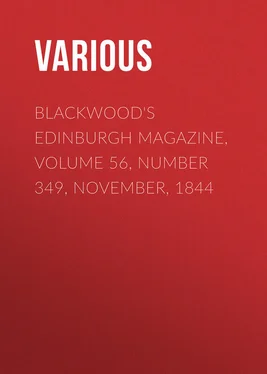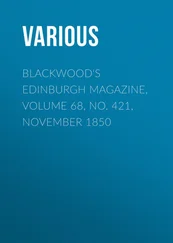Various - Blackwood's Edinburgh Magazine, Volume 56, Number 349, November, 1844
Здесь есть возможность читать онлайн «Various - Blackwood's Edinburgh Magazine, Volume 56, Number 349, November, 1844» — ознакомительный отрывок электронной книги совершенно бесплатно, а после прочтения отрывка купить полную версию. В некоторых случаях можно слушать аудио, скачать через торрент в формате fb2 и присутствует краткое содержание. Издательство: Иностранный паблик, Жанр: periodic, foreign_edu, Путешествия и география, на английском языке. Описание произведения, (предисловие) а так же отзывы посетителей доступны на портале библиотеки ЛибКат.
- Название:Blackwood's Edinburgh Magazine, Volume 56, Number 349, November, 1844
- Автор:
- Издательство:Иностранный паблик
- Жанр:
- Год:неизвестен
- ISBN:нет данных
- Рейтинг книги:4 / 5. Голосов: 1
-
Избранное:Добавить в избранное
- Отзывы:
-
Ваша оценка:
- 80
- 1
- 2
- 3
- 4
- 5
Blackwood's Edinburgh Magazine, Volume 56, Number 349, November, 1844: краткое содержание, описание и аннотация
Предлагаем к чтению аннотацию, описание, краткое содержание или предисловие (зависит от того, что написал сам автор книги «Blackwood's Edinburgh Magazine, Volume 56, Number 349, November, 1844»). Если вы не нашли необходимую информацию о книге — напишите в комментариях, мы постараемся отыскать её.
Blackwood's Edinburgh Magazine, Volume 56, Number 349, November, 1844 — читать онлайн ознакомительный отрывок
Ниже представлен текст книги, разбитый по страницам. Система сохранения места последней прочитанной страницы, позволяет с удобством читать онлайн бесплатно книгу «Blackwood's Edinburgh Magazine, Volume 56, Number 349, November, 1844», без необходимости каждый раз заново искать на чём Вы остановились. Поставьте закладку, и сможете в любой момент перейти на страницу, на которой закончили чтение.
Интервал:
Закладка:
" Fourth. To cause and procure, and aid and assist in causing and procuring, divers subjects of her Majesty unlawfully , maliciously , and seditiously to meet and assemble together in large numbers, at various times and at different places within Ireland, for the unlawful and seditious purpose of obtaining, by means of the intimidation to be thereby caused, and by means of the exhibition and demonstration of great physical force at such assemblies and meetings, changes and alterations in the government, laws, and constitution of the realm by law established.
" Fifth. To bring into hatred and disrepute the courts of law established in Ireland for the administration of justice, and to diminish the confidence of her Majesty's subjects in Ireland in the administration of the law therein, with the intent to induce her Majesty's subjects to withdraw the adjudication of their differences with, and claims upon, each other, from the cognisance of the said courts by law established, and to submit the same to the judgment and determination of other tribunals to be constituted and contrived for that purpose."
[This count sets out as overt acts of the above design, numerous meetings , speeches , and publications .]
The second count was the same as the first, omitting the overt acts .
The third count was the same as the second, only omitting from the fourth charge the words "unlawfully, maliciously, and seditiously."
The fourth count was the same as the third, omitting the charge as to the army.
The fifth count contained the first and second charges set forth in the first count, omitting the overt acts.
The sixth count contained the fourth charge set forth in the first count, omitting the words "unlawfully, maliciously, and seditiously," and the overt acts.
The seventh count was the same as the sixth, adding the words "and especially, by the means aforesaid, to bring about and accomplish a dissolution of the legislative union now subsisting between Great Britain and Ireland."
The eighth count contained the fifth charge set forth in the first count, omitting the overt acts.
The ninth count contained the fifth charge set forth in the first count, omitting the intent therein charged, and the overt acts, but adding the following charge – "And to assume and usurp the prerogatives of the crown in the establishment of courts for the administration of law."
The tenth count was the same as the eighth, omitting the intent stated in the fifth charge in the first count.
The eleventh count charged the conspiracy to be, "to cause and procure large numbers of persons to meet and assemble together in divers places, and at divers times, within Ireland, and by means of unlawful, seditious, and inflammatory speeches and addresses, to be made and delivered at the said several places, on the said several times, respectively, and also by means of the publishing, and causing and procuring to be published, to and amongst the subjects of her said majesty, divers unlawful, malicious, and seditious writings and compositions, to intimidate the Lords Spiritual and Temporal, and the Commons of the Parliament of the United Kingdom of Great Britain and Ireland, and thereby to effect and bring about changes and alterations in the laws and constitution of this realm, as now by law established."
The indictment was laid before the grand jury on the 3d November 1843, and, after long deliberation, they returned a true bill late on the 8th of November. After a harassing series of almost all kinds of preliminary objections, the defendants, on the 22d November, respectively pleaded "that they were not guilty of the premises above laid to his charge, or any of them, or any part thereof: " – and on the 16th January 1844, the trial commenced at bar, before the full court of Queen's Bench, viz. the Right Honourable Edward Pennefather, Chief-Justice , and Burton, Crampton, and Perrin, Justices , and lasted till the 12th February.
The Chief-Justice – a most able and distinguished lawyer – then closed his directions to the jury.
"I have put the questions to you in the language of the indictment. It lies on the crown to establish – they have undertaken to do so – that the traversers, or some of them, are guilty of a conspiracy, such as I have already stated to you – a conspiracy consisting of five branches, any one of which being brought home, to your satisfaction, to the traversers or traverser, in the way imputed, will maintain and establish the charge which the crown has undertaken to prove."
The jury were long engaged in discussing their verdict, and came once or twice into court with imperfect findings, expressing themselves as greatly embarrassed by the complexity and multiplicity of the issues submitted to them; on which Mr Justice Crampton, who remained to receive the verdict, delivered to them, in a specific form, the issues on which they were to find their verdict. They ultimately handed in very complicated written findings, the substantial result of which may be thus stated: All the defendants were found guilty on the whole of the last eight counts of the indictment, viz., the Fourth, Fifth, sixth, seventh, Eighth, Ninth, Tenth, and Eleventh counts.
Three of the defendants – Daniel O'Connell, Barrett, and Duffy – were also found guilty on the whole of the Third count, and on part of the First and Second counts – [that is to say, of all the first and second counts, except as to causing meetings to assemble " unlawfully, maliciously, and seditiously ."]
Four other of the defendants – John O'Connell, Steele, Ray, and Gray – were also found guilty of a part of the First, Second, and Third counts – viz., of all, except as to causing meetings to assemble unlawfully, maliciously, and seditiously , and exciting discontent and disaffection in the army. 5 5 Two of the defendants' (the two priests) names do not appear in the record of the verdict, as one of them (Tyrrell) died before the trial, and as to Tierney, the Attorney-General entered a nolle prosequi .
As soon as these findings had been delivered to the deputy-clerk of the crown, and read by him, a copy of them was given to the traversers, and the court adjourned till the ensuing term.
It should here be particularly observed, that it has been from time immemorial the invariable course, in criminal cases, as soon as the verdict has been delivered, however special its form, for the proper officer to write on the indictment, in the presence of the court and jury, the word " Guilty ," or " Not Guilty ," as the case may be, of the whole or that portion of the indictment on which the jury may have thought fit to find their verdict; and then the judge usually proceeds at once to pass judgment, unless he is interrupted by the prisoner's counsel rising to move " in arrest ," or stay of judgment, in consequence of some supposed substantial defect in the indictment. But observe – it was useless to take this step, unless the counsel could show that the whole indictment was insufficient, as disclosing in no part of it an offence in contemplation of law. If he were satisfied that there was one single good count to be found in it, it would have been idle, at this stage of the proceedings, to make the attempt; and it very rarely happens that every one of the varied modes of stating the case which has been adopted is erroneous and insufficient. If, then, the motion was refused, nothing else remained but to pass the sentence, which was duly recorded, and properly carried into effect. No formal or further entry was made upon the record – matters remaining in statu quo – unless the party convicted, satisfied that he had good ground for doing so, and was able to afford it, determined to bring a writ of error. Then it became necessary, in order to obey the command contained in the writ of error, to "make up the record" — i. e. formally and in technical detail to complete its narrative of the proceedings, in due course of law; for which purpose the verdict would be entered in legal form, generally (if such it had been in fact) or specially, according to its legal effect, if a special verdict had been delivered.
Читать дальшеИнтервал:
Закладка:
Похожие книги на «Blackwood's Edinburgh Magazine, Volume 56, Number 349, November, 1844»
Представляем Вашему вниманию похожие книги на «Blackwood's Edinburgh Magazine, Volume 56, Number 349, November, 1844» списком для выбора. Мы отобрали схожую по названию и смыслу литературу в надежде предоставить читателям больше вариантов отыскать новые, интересные, ещё непрочитанные произведения.
Обсуждение, отзывы о книге «Blackwood's Edinburgh Magazine, Volume 56, Number 349, November, 1844» и просто собственные мнения читателей. Оставьте ваши комментарии, напишите, что Вы думаете о произведении, его смысле или главных героях. Укажите что конкретно понравилось, а что нет, и почему Вы так считаете.












